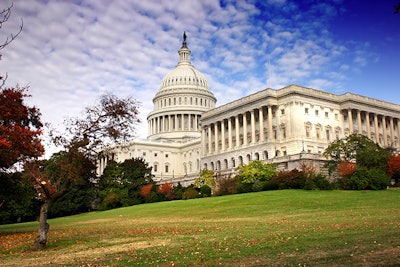
The Rohrabacher-Blumenauer amendment, a key cannabis industry protection, is safe for the time-being with Congress’ passage of a short-term spending deal that is set to expire Dec. 22.
The deal passed Dec. 7 by 81 to 14 in the Senate and 235 to 193 in the House, The Washington Post reports. It postpones a heated budget debate and avoids a partial government shutdown. The government now has until Dec. 22 to pass a long-term deal. Many issues remain unresolved, including whether the Rohrabacher-Blumenauer amendment will be included in the final budget. Discussions will continue in the coming weeks, per The Washington Post.
RELATED: Will Medical Marijuana Protections Come to an End?
“We are pleased to see that a continuing resolution extends [Rohrabacher-Blumenauer] protections for at least some period of time,” said Jeremy Unruh, director of public and regulatory affairs for PharmaCann LLC, a vertically integrated cannabis operation with facilities in Illinois and New York. “This industry gets stronger every day. Each day that this industry continues to solidify its existence makes it that much harder for those antiquated federal authorities who still buy into the failed War on Drugs to hold us back.”
“We’re pleased to see an extension of the Rohrabacher-Blumenauer protections for the progress that 30 states have now made in advancing medical cannabis reform,” added Justin Strekal, political director for NORML. “This short-term solution is yet another step, but structural reform is needed, and the fight goes on.”
“It just kicks the can down the road, really, but it does give us more time to reach out to members of Congress and try to assure that these protections are in the final FY2018 budget,” said Morgan Fox, director of communications for Marijuana Policy Project (MPP). “It’s significantly better than passing a budget without it, or a government shutdown that would allow [Attorney General Jeff] Sessions to use funds to go after patients and providers.”
A key protection for state-legal medical marijuana businesses, the Rohrabacher-Blumenauer amendment forbids the Department of Justice (DOJ) from using federal tax dollars to interfere with state medical cannabis laws, and has been included on every federal budget passed since December 2014, CNN reports.
“Rohrabacher-Blumenauer is really the only legal protection our industry has against federal authorities, and is of vital importance, hence its inclusion in budget resolutions since 2014,” Unruh said.
The House Rules Committee voted Sept. 6 to remove the Rohrabacher-Blumenauer amendment from the House budget bill, barring Congressional representatives from debating in a full House session whether to include the provision.
“The House rules have made offering R-B as an amendment from the floor impossible, and we look to the Senate to move that chamber's analogous bill forward in committee,” Unruh said.
The amendment remained on the Senate budget bill, and was ultimately extended through Dec. 8 as part of a bill that passed Sept. 8 to extend the federal debt ceiling.
The inclusion of the provision in the three-month spending package did not reverse it from being removed from the House appropriations bill, and the protections extended in this most recent spending deal need to be reauthorized by Congressional leadership as part of the forthcoming federal appropriations budget for the provision to remain in effect.
“In my view, the Department of Justice is hungrily watching to see if R-B restraints are included in the budget,” Unruh said. “If not, our industry will feel a chill of investor interest drying up, as those persons who were close to jumping into the industry may take pause.”
On Nov. 29, Representatives Dana Rohrabacher (CA-48) and Earl Blumenauer (OR-03) spearheaded a letter signed by 64 other members of the House of Representatives to urge House and Senate leadership to ensure inclusion of medical marijuana protections in any appropriations bill that funds the government beyond Dec. 8.
Similarly, in a Nov. 28 letter to Secretary of the Department of Health and Human Services (HHS) nominee Alex Azar II, Senator Elizabeth Warren outlines the need for marijuana policy reform. She writes that medical cannabis has the potential to mitigate the effects of the country’s opioid crisis, citing a 2017 American Journal of Public Health study that found that Colorado’s legalization of adult-use marijuana reduced opioid-related deaths in the state. She asks the HHS secretary nominee what he would do to further study cannabis as a potential alternative to opioids, if he is committed to implementing evidence-based policies regarding the use of marijuana and what steps he will take to improve the knowledge of the potential therapeutic benefits of medical marijuana.
Fox is hopeful that, based on this kind of support, the Rohrabacher-Blumenauer amendment will pass in the final appropriations budget.
“It’s not to the point where we’re just going to sit back and watch it happen, so we’re definitely encouraging our supports to continually reach out to members of Congress to get it included, but I’m definitely hopeful,” Fox said.
Tom Schultz, president of Connecticut Pharmaceutical Solutions—one of four licensed cannabis producers in The Constitution State—is also optimistic that the amendment will be included in the final version of the federal appropriations budget. He said there is no political force necessarily fighting against the inclusion of the provision, and from a policy standpoint, the amendment is likely to be passed.
"It’s one thing if one state goes one way and the federal government goes the other. But when we have 47 states going one way, it’s a much, much stronger statement. It changes the issue.” - Tom Schultz, President, Connecticut Pharmaceutical Solutions
“Twenty-nine states have approved legal [medical marijuana programs], and 18 more have approved limited medical,” Schultz said. “When we say limited medical and we talk about CBD, remember that the DEA would call all of those 47 programs illegal. So we have … an interesting question at the federal level. It’s one thing if one state goes one way and the federal government goes the other. But when we have 47 states going one way, it’s a much, much stronger statement. It changes the issue.”
Schultz noted that there has been no counter movement against any of the states that have established regulated marijuana programs, and no expectation that any of those state legislatures will change their policies any time soon.
“It’s fortunate that it has come out this way today [with the short-term deal],” Schultz said.
“[But] I think that we should acknowledge that in the context of the budget, this is a minor matter,” he added. “In the context of the 47 state legislatures, it’s also a minor matter. This is not going to change the policy progress on this issue in the country, however it turns out. I truly hope that in two weeks, it comes out again in a positive way, but let’s acknowledge that [however it comes out], it’s not going to change any of the 47 state legislatures, nor is it going to change the budget.”
Should the amendment not be included in the final appropriations budget, Schultz said he does not believe the federal government would attack a large number of state-compliant cannabis businesses.
“Were something to happen, I think it would, if anything, … stimulate perhaps a further reaction from one or more of those 47 state legislatures,” Schultz said. “That’s where I’d like the discussion to be.”
Top image: © Quantabeh | Dreamstime.com


























